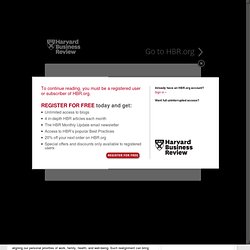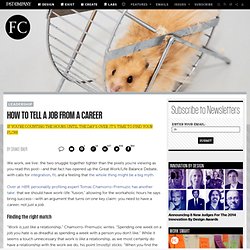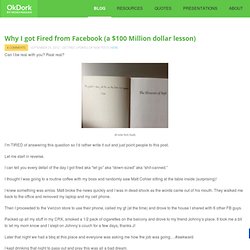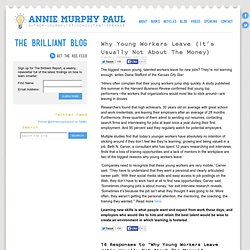

Work-Life "Balance" Isn't the Point - Christine M. Riordan. By Christine M.

Riordan | 1:00 PM June 4, 2013 Climbing the organizational ladder often requires employees to work long hours and deal with difficult and complex issues. Some days on the job are likely fun and positive and other days are tension-filled and stressful. A common dilemma for many people is how they manage all of the competing demands in work and life and avoid letting any negative effects of work spill over into their personal lives.
Research has in fact shown that employees who believe they do not have time for the personal life feel drained and distracted while they are at work. However, some people appear to manage career success and a positive private life with ease. 1. Marissa Mayer, CEO of Yahoo, came under scrutiny when she returned to work soon after the birth of her son. 2. 3. As Anna Quindlen observed, “If your success is not on your own terms, if it looks good to the world but does not feel good in your heart, it is not success at all.” How To Tell A Job From A Career. We work, we live: the two snuggle together tighter than the pixels you're viewing as you read this post--and that fact has opened up the Great Work/Life Balance Debate, with calls for integration, fit, and a feeling that the whole thing might be a big myth.

Over at HBR, personality profiling expert Tomas Chamorro-Premuzic has another take: that we should have work-life "fusion," allowing for the workaholic hours he says bring success--with an argument that turns on one key claim: you need to have a career, not just a job. Finding the right match "Work is just like a relationship," Chamorro-Premuzic writes. "Spending one week on a job you hate is as dreadful as spending a week with a person you don't like. " While it seems a touch unnecessary that work is like a relationship, as we most certainly do have a relationship with the work we do, his point (mostly) sticks: "When you find the right job, or the right person, no amount of time is enough. " Knowing the (psychological) difference. Why I got Fired from Facebook (a $100 Million dollar lesson) 12.9K Flares12.9K Flares × Can I be real with you?

Real real? (A note from Zuck) I’m TIRED of answering this question so I’d rather write it out and just point people to this post. Let me start in reverse. I can tell you every detail of the day I got fired aka “let go” aka “down-sized” aka “shit-canned.” I thought I was going to a routine coffee with my boss and randomly saw Matt Cohler sitting at the table inside (surprising)! I knew something was amiss. Then I proceeded to the Verizon store to use their phone, called my gf (at the time) and drove to the house I shared with 6 other FB guys. Packed up all my stuff in my CRX, smoked a 1/2 pack of cigarettes on the balcony and drove to my friend Johnny’s place. Why young employees quit their jobs. Tuesday, September 18, 2012 The biggest reason young, talented workers leave for new jobs?

They’re not learning enough, writes Diane Stafford of the Kansas City Star: “Hirers often complain that their young workers jump ship quickly. A study published this summer in the Harvard Business Review confirmed that young top performers—the workers that organizations would most like to stick around—are leaving in droves. Researchers found that high achievers, 30 years old on average with great school and work credentials, are leaving their employers after an average of 28 months. Multiple studies find that today’s younger workers have absolutely no intention of sticking around if they don’t feel like they’re learning, growing and being valued in a job. ‘Companies need to recognize that these young workers are very mobile,’ Carver said. How Google's Marissa Mayer Prevents Burnout. UPDATE: Marissa Mayer was named chief executive officer of Yahoo Inc.

July 16, 2012. Many entrepreneurs don't even think twice when it comes to working around the clock. Marissa Mayer, Google's 20th employee and current vice president of location and local services, is no exception. When Google was a young company, she worked 130 hours per week and often slept at her desk. "For my first five years at Google, I pulled an all-nighter every week," Mayer said in a recent talk at New York's 92Y cultural center.
Hard work, she says, has been the key to Google's success, as well as her own. For young companies that demand so much of their employees, hard work can spiral into burnout. Step 1. Her assessment is right on target. Related: 3 Postures to Boost Productivity Now Step 2. "People--particularly entrepreneurs--can put in huge amounts of energy and time," Leiter says. Related: A Secret to Creative Problem Solving Step 3. "You can't have everything you want," Mayer cautions.